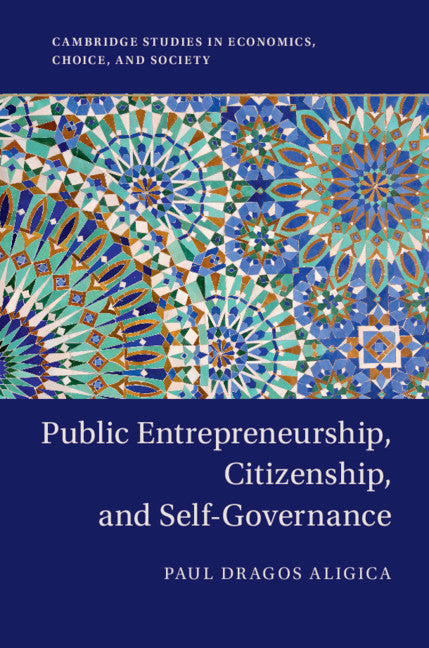Freshly Printed - allow 8 days lead
Couldn't load pickup availability
Public Entrepreneurship, Citizenship, and Self-Governance
Presents a fresh conceptualization of self-governance as a response to the cutting-edge challenges of populism, paternalism and authoritarianism.
Paul Dragos Aligica (Author)
9781316637012, Cambridge University Press
Paperback / softback, published 16 August 2018
236 pages
22.7 x 15.1 x 1.5 cm, 0.35 kg
'We are beset today by increasing skepticism of the viability and intelligence of democratic self-governance, raising doubts that traditional defenses fail to assuage. In this scholarly and important book, Paul Dragos Aligica shows how the Ostroms' pathbreaking work points to a reconceptualization of democratic citizenship, tying it to an enlightening idea of problem solving through public entrepreneurs. Aligica articulates a compelling vision of the institutions of a diverse and intelligent open society.' Gerald Gaus, James. E. Rogers Professor of Philosophy, University of Arizona, Tucson
In this book Paul Dragos Aligica revisits the theory of political self-governance in the context of recent developments in behavioral economics and political philosophy that have challenged the foundations of this theory. Building on the work of the 'Bloomington School' created by Nobel Laureate Elinor Ostrom and Public Choice political economy co-founder Vincent Ostrom, Aligica presents a fresh conceptualization of the key processes at the core of democratic-liberal governance systems involving civic competence and public entrepreneurship. The result is not only a re-assessment and re-articulation of the theories constructed by the Bloomington School of Public Choice, but also a new approach to several cutting-edge discussions relevant to governance studies and applied institutional theory, such as the debates generated by the recent waves of populism, paternalism and authoritarianism.
Introduction
Part I. Public Entrepreneurship: 1. Public entrepreneurship, competitive governance and polycentricity
2. Entrepreneurship and collective action
3. Voluntary actions and institutions: charting the territory
Part II. Citizenship: 4. Citizenship, political competence and civics: the Ostromian perspective
5. From institutionalism to models of social agents: citizenship in institutionalist context
6. Citizens' competence, self-governance and the new epistocratic paternalism
Part III. Self-Governance: 7. Anarchy, statism and liberalism: the self-governance alternative
8. Conservatism, interventionism and social evolution: the self-governance alternative
Conclusions.
Subject Areas: Political economy [KCP], Behavioural economics [KCK], Economics [KC], Social & political philosophy [HPS]


